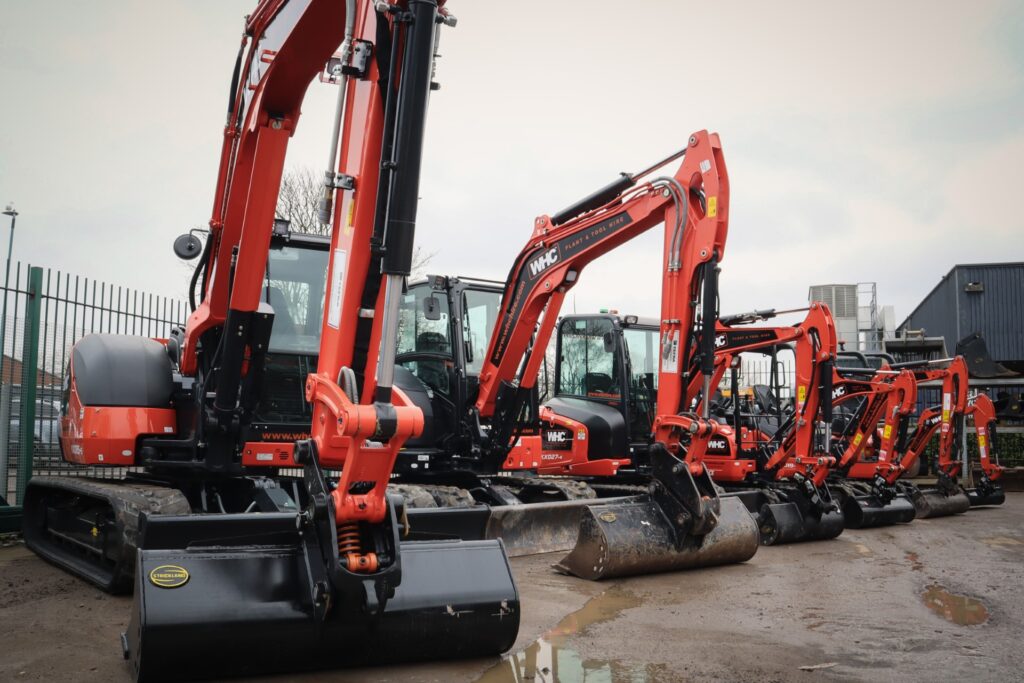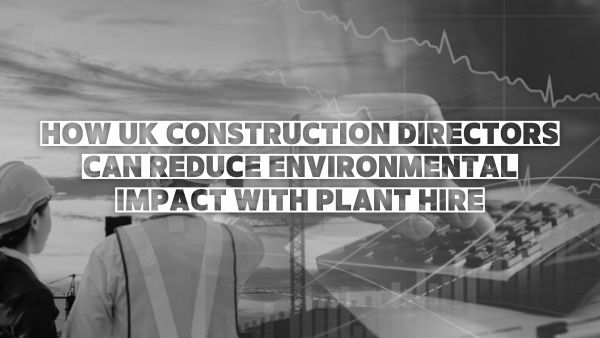How UK Construction Directors Can Reduce Environmental Impact with Plant Hire
In today’s construction industry, the environmental impact of your projects is more important than ever. Not only is it essential for preserving our planet, but staying compliant with the latest UK legislation can also enhance your business reputation, lead to cost savings, and ensure you avoid hefty fines. This guide is designed to help construction managing directors, understand the areas where you can reduce your environmental impact and keep up with current laws. Plus, we’ll show you how our plant hire services can play a crucial role in achieving these goals. Let’s begin by highlighting the environmental impact in construction.
Understanding Environmental Impact in Construction
Environmental impact in construction refers to the effects your projects have on the local and the global environment. This can include everything from energy consumption and waste generation to pollution. Recognising these impacts is the first step toward making meaningful changes.
Local Environment – refers to the immediate physical surroundings that impact individuals’ daily lives within a specific geographical location. This will include elements such as air quality, water sources, green spaces, wildlife and urbanised ecosystems.
Global Environment– refers to the overall footprint construction companies create within their entire operation on a global scale. This is normally highlighted in sectors such as Construction, manufacturing, agriculture, retail, etc.
Common Sources of Environmental Impact
It is vital to understand the common sources of environmental impact that occur from most UK construction companies. Identifying these factors is essential to assess your business’s starting point.
- Waste Generation: Construction sites often produce a significant amount of waste, much of which can end up in landfills.
- Transportation: All construction sites will import goods, materials and equipment from all over the UK with its own inherited footprint.
- Energy Consumption: The energy used in the construction process and by buildings once they are complete contributes to carbon emissions.
- Pollution: Construction activities can result in air and water pollution, affecting local ecosystems.
Latest UK Legislation on Environmental Impact in Construction
Staying up-to-date with legislation is crucial for compliance and can guide your efforts to minimize environmental impact. Here are some key pieces of legislation you should be aware of:
The Environment Act 2021
This comprehensive act aims to improve air quality, protect biodiversity, and promote sustainable resource use. For construction businesses, this means integrating practices that reduce emissions and protect natural habitats.
Building Regulations (Part L)
Part L of the Building Regulations focuses on the conservation of fuel and power. This requires buildings to be energy-efficient, pushing construction businesses to adopt greener practices and technologies.
Construction and Demolition Waste Management Regulations
These regulations focus on the importance of reducing, reusing, and recycling waste from construction sites. Proper waste management not only helps the environment but can also be cost-effective.
Net Zero Strategy
The UK’s Net Zero Strategy sets out plans to achieve net zero carbon emissions by 2050. Construction businesses are now being challenged to adopt sustainable building practices to reduce their carbon footprint.
Keeping clued up on the latest UK legislation on environmental impact is not only essential for legal compliance but also for the sustainable success of your construction business. To stay informed about updates and changes in legislation, you can regularly check the following sources:
- UK Government Website: (https://www.gov.uk/) for official updates and detailed information on current legislation.
- Environment Agency: (https://www.gov.uk/government/organisations/environment-agency) for guidelines and regulatory information.
- Construction Industry Publications: Websites like Construction Plant News (https://cpnonline.co.uk/
- Trade Associations: Organizations such as IOSH (https://iosh.com/news-and-opinion)
By leveraging these resources, you can ensure your business remains compliant with the latest environmental legislation and continues to lead in sustainable construction practices.
Identifying Areas for Improvement in Your Business
Conducting a self-assessment can help you pinpoint areas where your business can improve its environmental impact. Here are some tips to get started:
Energy Efficiency
- Upgrade to energy-efficient equipment: Use modern, energy-efficient machinery will significantly reduce energy consumption.
- Implement renewable energy solutions: Consider renewable energy solutions for your construction project.
Waste Management
- Reduce waste: Plan projects carefully to minimise material waste.
- Reuse and recycle materials: Implement systems to sort and recycle waste on-site.
Sustainable Materials
- Choose sustainable materials: Opt for materials that are recycled, recyclable, or sustainably sourced to reduce your inherited footprint.
- Innovative products: Choose product designs that offer a lower environmental impact.
Pollution Control
- Dust suppression: Adopt water sprays or dust extraction systems to minimize air pollution.
- Water management: Ensure you implement measures to reduce water contamination and run off from construction sites.
Identifying and addressing these key areas within your construction business can make significant strides toward reducing its overall environmental impact. Remember that each step you take not only helps in complying with the latest UK legislation, but also contributes to a more sustainable future.
Action Plan for Construction Managing Directors
To help you get started with reducing your environmental impact on your operation, here’s a step-by-step action plan:
Step 1: Get Up to Speed
Get up to speed on the latest legislation on environmental impact in construction. By reading this article you’ve already begun your journey.
Step 2: Conduct an Environmental Audit
Assess your current practices and identify areas for improvement.
Step 3: Develop an Environmental Management Plan
Create a detailed plan outlining the timeline and steps you will take to reduce your environmental impact.
Step 4: Implement Changes
Put your plan into action, making necessary changes to your operations. Leverage the benefits a reputable plant hire supplier can offer you.
Step 5: Monitor and Report Progress
Regularly review your progress and adjust your plan as needed. Reporting your successes will enhance your business reputation. In addition, keep up to date with regular legislation changes.
Implementing an effective action plan is crucial for managing and reducing the environmental impact of your construction business. Remember that by taking the time to absorb the information in this article, you are already well on your way. By conducting your own thorough examination of your operation, you will be able to implement strategic changes to meet UK legislation. Further, it will also highlight areas where you can improve your productivity and efficiency.
How Our Plant Hire Services Can Help

WHC Hire Services specialises in providing plant hire services that support construction businesses in reducing their environmental impact and staying compliant with the latest legislation. Here’s how our innovative service can assist you:
Energy-Efficient Machinery
Our fleet of plant hire equipment only includes the latest models, designed to be energy-efficient, helping you reduce fuel consumption and lower emissions on your construction sites.
Sustainable Practices
We offer machinery and equipment that support sustainable construction practices, from waste management solutions to pollution control measures.
Regular Maintenance
Our equipment undergoes regular maintenance from our in-house team. This ensures optimal performance and compliance with environmental standards, reducing the risk of breakdowns and inefficiencies.
Choosing a reputable plant hire supplier with a strong environmental strategy is essential for the success of your construction projects. A supplier committed to sustainability, not only provides energy-efficient and well-maintained machinery, but also supports you with your environmental goals.
Conclusion

Reducing the environmental impact of your construction projects and staying compliant with the latest UK legislation is not just good for the planet – it’s good for your business. By following the steps outlined in this guide and leveraging leading plant hire services, you can make a significant difference to your operation. Ready to take the next step? Contact us today to see how WHC Hire Services can help reach your targets. Let’s build a greener future together! Call 01684377977 or visit our contact us page today.

